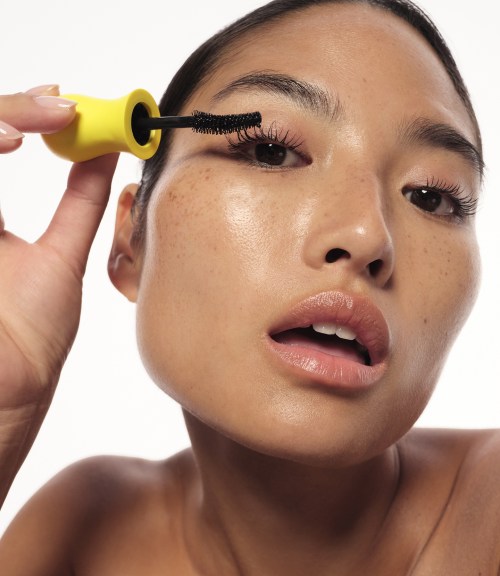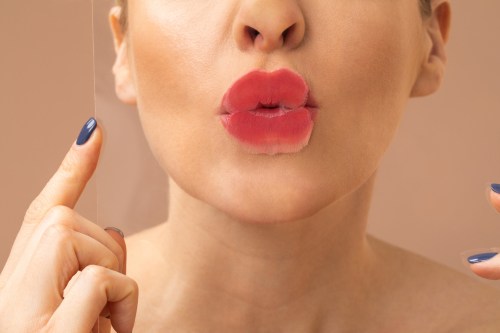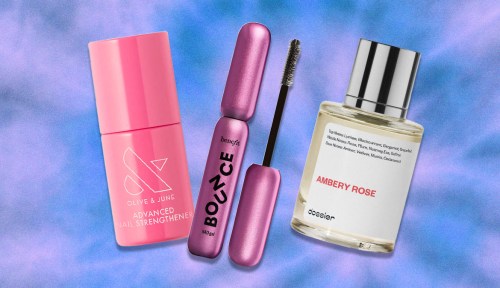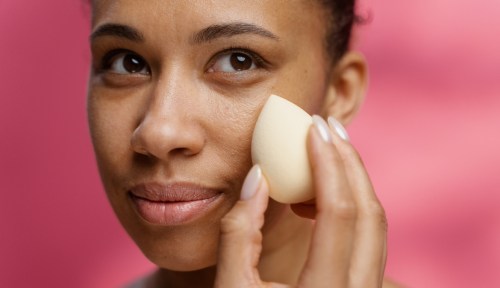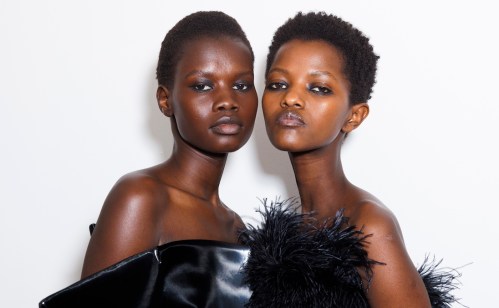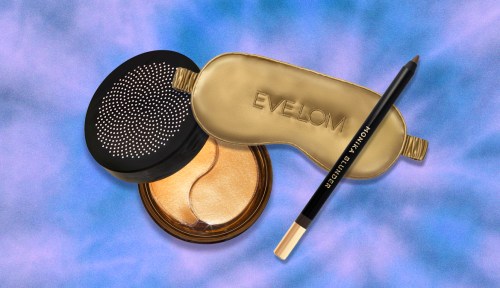Our editors independently select these products. Making a purchase through our links may earn Well+Good a commission
It’s Been 5 Years Since Rihanna Launched Fenty’s 40-Shade Foundation Range, and It’s Changed Beauty for the Better
When those 40 shades of the Fenty Beauty Pro Filt’r foundation hit shelves in September 2017, the impact was undeniable.
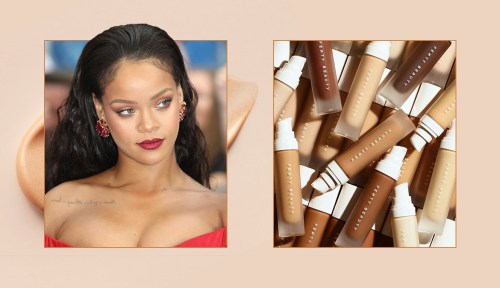
When Fenty Beauty dropped five years ago, it did so with a simple premise: to create top-tier makeup products that worked for all skin tones. At the time, this was a novel concept, especially when it came to foundation. Beauty lovers with deeper skin tones had become accustomed to mixing their own blends of different formulas to get the right shade—one that wasn’t too light, too ashy, or too orange. When those 40 shades of the Pro Filt’r Soft Matte Longwear Liquid Foundation hit shelves in September 2017, the impact was undeniable.
Experts in This Article
Brooklyn-based makeup artist
Nyakio Grieco is the founder of skin-care line Nyakio Beauty and co-founder of Thirteen Lune, an e-commerce platform highlighting Black-owned beauty brands.
“When Fenty first arrived, my office was right across the street from the Times Square Sephora. I remember running in and being super excited to just try out the foundations in particular because I’ve always had a hard time finding foundations,” says Brooke DeVard, host of the Naked Beauty podcast. “Seeing every single dark shade just completely sold out on the first day—it was very powerful. It showed how serious the demand was.”
Fenty Beauty presented an opportunity for many people of color to see themselves represented in beauty for the first time. Not only did the products work for them, but the marketing and branding made it clear that it was made for them. In the five years since its launch, Fenty has had a major (and much-needed) effect on the beauty industry.
Raising the beauty bar
“It almost feels like Fenty has always been around because they’ve been so impactful,” says Emily Amick, a Black makeup artist in New York City. But having worked in the industry for decades, she recalls a time before Fenty when she had to mix custom shades for her melanin-rich clients.
“When I was first starting out, you had to go to specialty brands like Black Opal to get these rich deep colors for women of color,” says Amick. “You had to really search long, far, and wide to get really great shades. I remember using products like Kryolan and Cinema Secrets and industry brands that makeup artists know but no one else would’ve ever heard of.”
Not only are brands like these hard to come by, but their products, which are designed for the stage, are thick and difficult to work with. “As a makeup artist, I know how to sheer things down or use a product in a way that’s going to be more like a liquid,” says Amick. “But you have to get your potions together and mix things up and it wasn’t very accessible to the everyday woman.”
The lack of appropriate shades for Black women went on for so long that it became normalized.
“I look at old pictures of people, like Studio 54 photos, and it’s like all the Black women look so ashy because the cosmetics that they were using were not rich enough and no one understood the undertones of Black skin,” says Amick. “They made these products that made you look gray or kind of purple. If you go back and look at photos, it’s [wild] that’s what we were putting up with. Our biggest supermodels and biggest stars are out there looking [ashy] because no one had makeup that worked for them.”
Fenty Beauty came into the industry determined to work for everyone. In addition to perfecting shades for deeper skin, Fenty also got praise for its lightest shades from Albino people. And its inclusivity stretched beyond complexion.
“Fenty Beauty covered a range of people who have been overlooked in the industry and they did this not only from a skin-tone angle,” says Adubi. “The beauty industry had always focused on perfection with its marketing. To the best of my knowledge, I did not see brands considering mono lids or plus-sized, hijabi, or disabled models. But Fenty Beauty came and did that. Now, we see more and more of this inclusivity in the industry.” Plus, Fenty Skin, the skin-care arm of Fenty Beauty that launched in July 2020, is marketed as genderless. It features men and women in its ad campaigns, because as Rihanna put it on Twitter in 2020, “Whoever told you skincare has a gender LIED to you!”
Beyond its overarching inclusivity, Fenty’s branding is unapologetically Black. “One of the things that Fenty has done differently is its product naming,” says DeVard. “[What’s] been interesting about Fenty is how they’ve taken a lot of language that’s used and beloved in the Black community and put that in their copy, marketing materials, product naming. Beyond the shade range, that’s one of the things that stands out the most about Fenty—its social tone of voice and that embrace and respect for language that’s been pioneered by the Black community.”Not only does the brand call its eyeliner “Flyliner,” but one of the shades—“Cause I’m Black”—was named after Rihanna’s viral response to a troll who asked why her hair looked so nappy on the Man Down single cover (“Cuz I’m black bitch!!!!”). There’s also the “Stunna” lip paint and the “Pore Snatch” skin-prep set.
Fenty wasn’t afraid to hit the industry’s shortcomings head-on. It found the gaps in the industry and seamlessly stepped in to fill them, creating a new standard that couldn’t be ignored.
Changing the industry for the better
The launch of Fenty Beauty instantly set into motion what is now known as the “Fenty Effect.” In the months following Fenty’s launch, leaders behind makeup brands from drugstore to high-end quickly realized that they needed to do better.
After receiving criticism for launching its Amazonian Clay Full Coverage Foundation with just 25 shades, Tarte upped its count to 40 in May 2018. That spring, Jouer Cosmetics took the shade range for its Essential High Coverage Crème Foundation from 33 to 50 and Georgio Armani expanded the shade range for its Luminous Silk Foundation from 25 to 31. When Covergirl launched its TruBlend Matte Made Foundation in May 2018, it did so with 40 shades (previously, its foundation with the largest shade range was the TruBlend Liquid Makeup in 21 shades). Too Faced went a step further and tapped Black beauty vlogger Jackie Aina—who is regarded as an authority on makeup for darker complexions—to help them expand the shade range of its Born This Way Foundation from 24 to 35. Fenty eclipsed itself in 2019 by increasing its range to 50 shades. Now, it’s up to 59. And of the 50 top-selling medium-and-full-coverage foundations (which require more precise shades for a match than sheer-to-light formulas) at Sephora, 38—about 76 percent—have 30 or more shades.
In addition to expanded foundation shade ranges, the years since Fenty’s launch have seen the emergence of bronzers that run deep enough for Black skin, “translucent” powders that are translucent on everyone, and eye shadow palettes that are actually usable on deeper complexions. “There’s nothing more frustrating than buying an eyeshadow pallet and only being able to use three or four of the shades within the pallet because the others don’t show up on your skin,” says Nyakio Grieco, co-founder of Thirteen Lune, a beauty retailer that boasts 90 percent Black and brown-founded brands. “Fenty has really called everyone in the industry to make sure that they’re delivering and not cherry-picking what products work for people of color.”
Creating space for other Black founders to flourish
Seeing Fenty Beauty thrive is part of the reason Kilali Cosmetics founder Tope Adubi had the confidence to launch her own makeup brand in February 2020.
“Before Fenty, it seemed that businesses wanted to do exactly what was being done by businesses that launched before them. They seemed to play in the familiar space, but Fenty Beauty came and changed all that,” says Adubi. “It showed everything can be possible and you just need to go for it. It screamed hope.”
But a brand needs more than hope to succeed: It needs support and capital. Although Rihanna launched Fenty with her star power and the backing of luxury conglomerate Louis Vuitton Moët Hennesy (LVMH), it lent a sense of legitimacy to Black-owned brands that was previously lacking in the eyes of investors and retailers. Sadly, the industry didn’t truly kick their support of Black founders into high gear until the racial reckoning that happened during the summer of 2020 following the killing of George Floyd, Breonna Taylor, and Ahmaud Arbery. Case in point: Fenty Beauty was one of just seven Black-owned brands sold in Sephora as of July 2020. Now, there are 23.
That summer is when we saw the 15 Percent Pledge, a nonprofit organization that works with retailers like Sephora, Nordstrom, and Ulta to ensure that 15 percent of their shelf space is dedicated to Black-owned brands, come to be. It’s also when Grieco launched Thirteen Lune as an online store (last year, the brand became the official in-store and online beauty retailer at JC Penney and is expected to be in 600 stores by the end of 2023). Black-owned brands like Ami Colé, Gilded Body, and Bossy Cosmetics are now much easier to find and shop. Fenty alone can’t be credited with this growth, but it certainly led the charge.
“Fenty, having the level of success that they’ve been able to achieve, has just called the industry to be more responsible when it comes to considering all consumers and the products that they’re delivering,” says Grieco. “Fenty has really shown that we have not only an opportunity, but a responsibility to serve a consumer who has been underserved for far too long.”
Rihanna put her whole self into Fenty, and it’s become a reflection of her and of the community she represents. In seeing her, many of us—particularly Black women—saw ourselves. The brand was never about fitting in: it was about play and joy and the freedom to feel your best. And its refreshed and inclusive approach to beauty has rubbed off on the rest of the industry.
“It’s like the moment Fenty Beauty launched, a lot of beauty businesses woke up from a slumber and realized a lot more can be done,” says Abudi. What Fenty has accomplished in five short years is nothing short of amazing. And we can’t wait to see what’s next.
Sign Up for Our Daily Newsletter
Get all the latest in wellness, trends, food, fitness, beauty, and more delivered right to your inbox.
Got it, you've been added to our email list.
